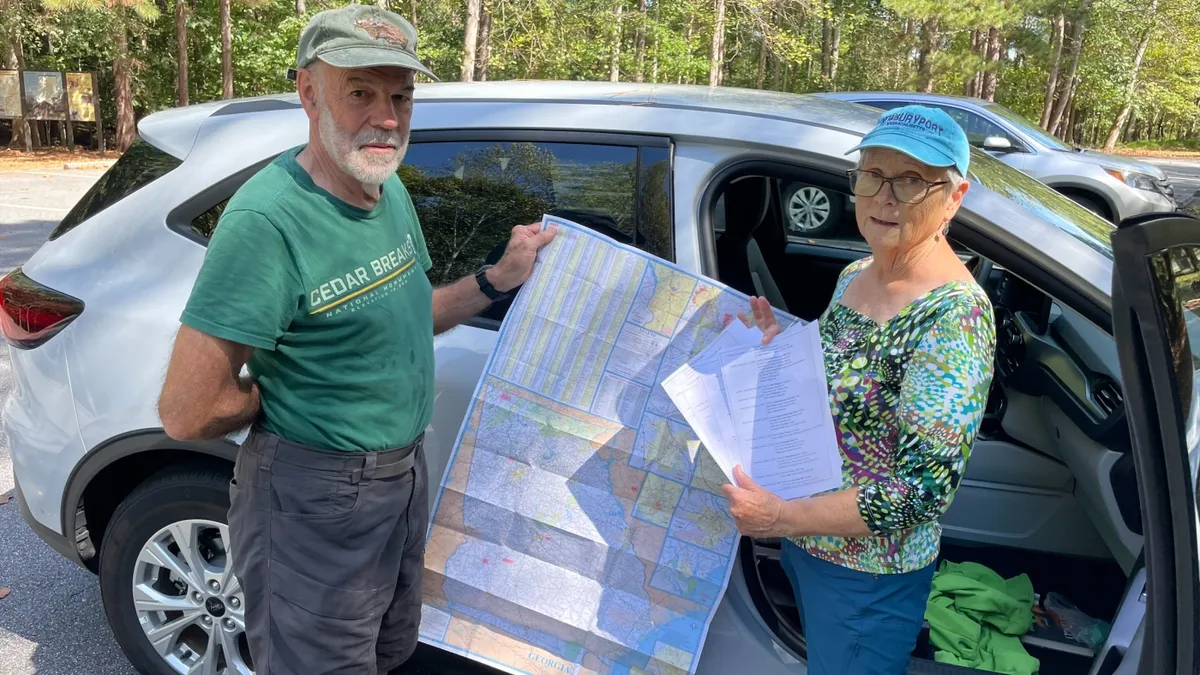
The federal government is currently experiencing a shutdown that has now extended into its third day. This situation has led to the closure of national park visitor centers and the furlough of hundreds of thousands of federal employees. In this contentious political climate, both Republicans and Democrats are urging voters to hold the opposing party accountable for the consequences of the shutdown. However, in Georgia, many residents are less concerned about assigning blame and more focused on the potential duration of the shutdown.
The last significant federal shutdown lasted 35 days, from December 2018 to January 2019. During that period, Transportation Security Administration (TSA) employees at Atlanta's massive airport were particularly affected, as they were required to continue working without pay. Kyle Waide, president of the Atlanta Community Food Bank, recounted the challenges faced during that time: “We had mass distributions of food, and there were hundreds of cars in line of people who needed help.” Waide expressed uncertainty about whether his organization would see a slight increase in requests for assistance or a more dire situation if the shutdown persists for an extended period.
Waide noted that if funding for federal food aid programs, such as Women, Infants, and Children (WIC), runs out, the nonprofit will struggle to meet the demand for basic necessities like baby formula. “There will be more demand that food banks will have to respond to, on top of the extraordinary level of need that they're already facing,” he said.
At the Centers for Disease Control and Prevention (CDC), which employs thousands in Atlanta, the shutdown comes at a particularly challenging time. The Trump Administration had already reduced CDC jobs and programs before the shutdown. Recently, a shooter fired hundreds of rounds at CDC buildings, further complicating the environment for employees. Yolanda Jacobs, president of the union chapter representing CDC employees, remarked, “It feels like there's malice, compared to what it was like back in 2018, 2019. Now we feel like whatever is happening is meant to intentionally clear out and cull the herd, so to speak.”
Georgia farmers are also bracing for the consequences of the shutdown, which could delay vital block grant funding and agricultural data. Ben Parker, the national affairs coordinator at the Georgia Farm Bureau, emphasized the importance of timely decisions: “Very few things in this world have to be done on time. Planting and harvesting are two of them.” Parker expressed concern that the congressional impasse is distracting lawmakers from passing a crucial Farm Bill, stating, “At the end of the day, I can only speak for agriculture. Shutdowns don’t help farmers.”
At the expansive 7,000-acre Chattahoochee River National Recreation Area, Brittany Jones, director of the nonprofit Chattahoochee National Park Conservancy, is worried about the long-term effects of a prolonged shutdown. She recounted her sleepless night while waiting to see if she would have to cancel several fourth-grade field trips planned for the park. “We’re going to have to unfortunately disappoint all those kids that were excited to come to their national park,” Jones lamented. Currently, only five park service employees are available to cover the vast area across nine sites. While she is proud that her organization can step in during this crisis, Jones is apprehensive about setting a precedent for taking on too many responsibilities.
Mary Keesee, an 83-year-old frequent visitor to the park, expressed uncertainty about who is responsible for the shutdown. She mentioned hearing discussions about health insurance subsidies but remains unclear about the specifics. The confusion stems from conflicting narratives, including claims by Republicans that Democrats want to provide subsidies to undocumented immigrants. On the other hand, Democrats are advocating for the continuation of subsidies for Affordable Care Act health insurance plans, which are set to expire soon. Without these subsidies, many policyholders could face significant premium increases, jeopardizing their ability to afford coverage.
Visitors to the park are also feeling the impact of the shutdown. Stephen and Amantha Moore, who traveled from Massachusetts, reflected on their disrupted plans. “My retirement goal is to visit every park managed by the Park Service, so this is day two of a trip that appears like it's not going to go as planned,” Stephen Moore stated. Amantha added, “I respect the Democrats for taking a stand, finally,” but questioned how long the standoff could last. Their experiences underscore the emotional toll that the shutdown is taking on families and federal workers alike.
This area of Atlanta is poised to be a significant battleground in the upcoming midterm elections, especially with Democratic Senator Jon Ossoff seeking reelection. Ossoff voted against the Republican stop-gap bill, which could influence local sentiments. Residents like J.D. Rhine, who tries to remain neutral, find it challenging to determine who to blame for the shutdown. In contrast, others like Reg Hunter are quick to hold Democrats accountable for the situation. As the shutdown continues, the impact on voter sentiment and the upcoming elections remains to be seen.
As the federal government shutdown persists, the repercussions for Georgia's residents, workers, and agricultural sector are becoming increasingly evident. The urgency for a resolution grows as families and federal employees navigate the uncertainty of their futures.